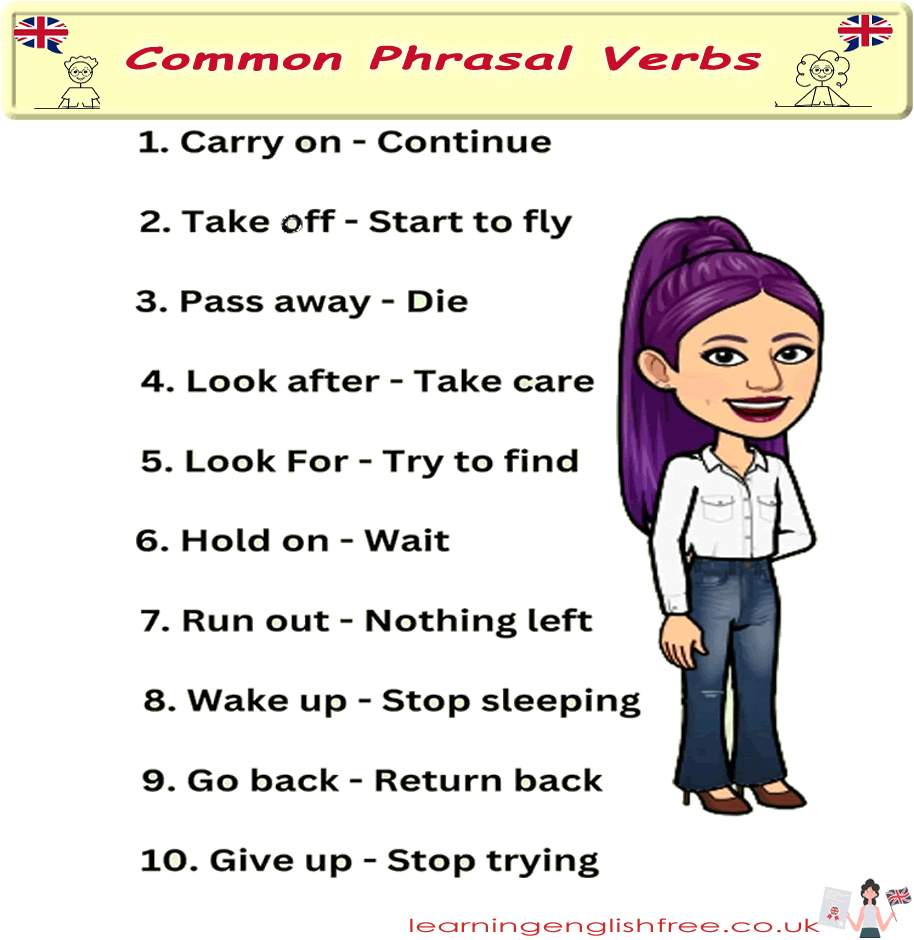
Common Phrasal Verbs Used Everyday
Welcome to our lesson on common phrasal verbs, a crucial component of everyday English that can be perplexing for ESL learners. Phrasal verbs combine a verb with a preposition or adverb, altering the original verb's meaning. Understanding these can significantly improve your fluency and comprehension. This guide will walk you through the meanings and uses of essential phrasal verbs, complete with examples to help solidify your knowledge.
Useful Vocabulary for Common Phrasal Verbs:
-
Carry on - Continue
- Meaning: To continue doing something.
- Example: Despite the rain, the team decided to carry on with the match.
-
Take off - Start to fly
- Meaning: When an aircraft begins to fly.
- Example: The plane took off on time despite the bad weather.
-
Pass away - Die
- Meaning: A polite expression for dying.
- Example: My grandmother passed away after a long illness.
-
Look after - Take care
- Meaning: To take care of someone or something.
- Example: Can you look after my cat while I'm on holiday?
-
Look for - Try to find
- Meaning: To try to find something.
- Example: I'm looking for my keys; have you seen them?
-
Hold on - Wait
- Meaning: To wait for a short time.
- Example: Hold on a moment; I'll check if your order is ready.
-
Run out - Nothing left
- Meaning: To use all of something and have no more left.
- Example: We've run out of milk; I'll need to buy some more.
-
Wake up - Stop sleeping
- Meaning: To stop sleeping.
- Example: I wake up at 6 am every day for work.
-
Go back - Return
- Meaning: To return to a place.
- Example: We decided to go back home due to the storm.
-
Give up - Stop trying
- Meaning: To stop trying to do something because it is too difficult.
- Example: After several attempts, he gave up trying to start the car.
Conclusion / Summary and Takeaways
Today's lesson on common phrasal verbs is a stepping stone towards achieving fluency in everyday English. Phrasal verbs are not only prevalent in casual conversation but also in written texts, making them indispensable for comprehensive language understanding.
Key Takeaways:
- Consistent Practice: Incorporate these phrasal verbs into your daily conversations and writing. The more you use them, the more naturally they will come to you.
- Create Visuals: Draw or find images that represent each phrasal verb. Visual learning aids can be powerful memory triggers.
- Sticky Note Reminders: Place sticky notes around your living space with phrasal verbs and their meanings. This constant exposure will reinforce your learning.
- Apply Your Knowledge: Try to identify phrasal verbs when listening to English songs, watching movies, or reading books. This contextual learning helps solidify understanding.
We encourage you to continue exploring and practicing English with us. For more lessons and tips, visit our Facebook page at www.facebook.com/learningenglishfree.co.uk. Engage with our community, share your progress, and discover even more resources to aid your learning journey.
